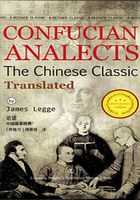
CHAPTER 25
1. Yen Yuen and Ke Loo being by his side, the Master said to them, "Come, let each of you tell his wishes."
2. Tsze-loo said, "I should like, having chariots and horses, and light fur dresses, to share them with my friends, and though they should spoil them, I would not be displeased."
3. Yen Yuen said, "I should like not to boast of my excellence, nor to make a display of my meritorious deeds."
4. Tsze-loo then said, "I should like, sir, to hear your wishes." The Master said, "They are, in regard to the aged, to give them rest; in regard to friends, to show them sincerity; in regard to the young, to treat them tenderly."
24. PRAISE OF SINCERITY, AND OF TSO-K'EW MING. 巧言令色, see I. 3. 足恭, 'excessive respect', 足being in 3d tone, read tseu. Some of the old comm., keeping the usual tone and meaning of 足, interpret the phrase of movements of the 'feet' to indicate respect. The discussion about Tso-k'ew Ming are endless. See 四书摭余说, I.30. It is sufficient for us to rest in the judgment of the comm. 程, that 'he was an ancient of reputation'. It is not to be received that he was a disciple of Conf. 丘was the name of Conf. The Chinese decline pronouncing it, always substituting mow(某), 'such an one', for it.
25. THE DIFFERENT WISHES OF YEN YUEN, TSZE-LOO, AND CONFUCIUS. 1.盍各言尔志, 'why not each tell your will?' 2. A student is apt to translate—'I should like to have chariots and horses, &c,' but 共is the import. word in the par., and under the regimen of 愿. 衣, up.3d tone, 'to wear'. Several writers carry the reg. of 愿 on to之, and removing the comma at共, read 共敝 together, but this constr. is not so good. 3. In Ho An's compilation 施劳 is interpr.—'not to impose troublesome affairs on others'. Choo He's view is better. Comp. the Yih-king, 系辞, I.ii.10. 4. 信之=与之以信, 'To be with them with sincerity.'—The Master and the disci., it is said, agreed in being devoid of selfishness. Hwuy's, however, was seen in a higher style of mind and object than Yew's. In the sage, there was an unconsciousness of self, and without any effort, he propos. acting in regard to his classification of men just as they ought severally to be acted to.
